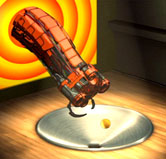 Written by: Peter Chung
Written by: Peter ChungDirected by: Peter Chung
 Written by: Peter Chung
Written by: Peter Chung
Directed by: Peter Chung
Peter Chung is also the director of the movie Aeon Flux.
Humans at a watchpost for a human colony outside of Zion (on the Earth's surface) spot a couple of fast "runner" machines scouting their area. The humans run back to a laboratory and lure the machines into a room in which they find a key. They use the key to unlock a door which reveals a giant human-controlled machine that blasts and disables both machines.
As they repair one of the "runner" machines, they get into a discussion of whether it is different to reprogram machine than it is to cause a machine to choose to change to the humans' side through free will and brainwashing.
After repairing the runner, the humans plug themselves and the runner into a playful, colorful simulation in which the runner appears human. The humans provide the runner with a choice to return to machine form or remain in human form, and the robot chooses to stay in human form.
Right after that choice is made, sentinels deliver a devastating attack on the lab, apparently detecting the homing signal that came from the runners just before they were destroyed. During the battle, the runner fights against the sentinels, and the only two who survive the attack are the runner and the woman who lured it into the lab, who is unconscious. The runner plugs himself and the woman back into the simulation, and the woman says "no" in disbelief of what the runner has done just before she dies.
The last scene shows the runner sitting on the shore by the campfire, apparently continuing the work of the humans.
The title of this film draws upon two meanings of matriculate, the first having to do with time spent learning at school, and the second referring to insertion into the Matrix. The machine matriculates in order to learn about humans in the "school" of the humans' virtual reality.
While this story demonstrates an ironic twisting of what the Matrix is (a matrix to fool machines instead of a matrix to fool humans), I believe the more significant point of the story is to provide the audience with yet another example of how the machines are worth saving. They make choices like humans do, they fight for causes they believe to be right, and they can become "friends" with those programmed to be their enemy. As Rama-Kandra demonstrates, machines can feel love. As the Oracle demonstrates, machines can have faith and even make irrational choices. And, as Deus Ex Machina indicates when it talks to Neo, machines can feel anger and pride.
The end of M3 delivers a much more powerful emotional impact when keeping this in mind.
We also learn from this episode that machines have not completely wiped out the human race from the surface of the planet. There are apparently human outposts scattered all over the place that machines are always scouting for.
| Back to Animatrix |
 The Animatrix: A Detective Story |  Matrix Comics |